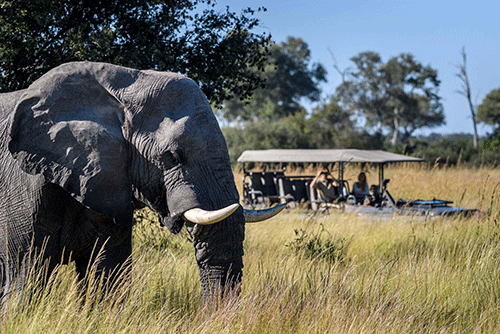Emmanuel Koro
The Covid-19 pandemic is clearly refusing to go away and is causing great damage in Africa - to both humankind and the tourism industry. This, in turn, is drastically reducing the income needed to conserve African wildlife.
“Funding for anti-poaching efforts and basic operating costs, including staff salaries, have been slashed, creating opportunities for poachers as patrolling and other security measures decrease,” said Dan Stiles, Kenya-based wildlife expert.
Therefore, an alternative strategy to generate funds for wildlife conservation is clearly needed. But sadly, SADC countries are doing precious little to deal with the reduction of conservation funds from tourism let alone create a new source of funding. Why aren’t they engaging the international community on this topic, given how outspoken and officious it is on how Africa should deal with its natural resources?
Is the lack of comment from both UNEP and CITES because they are now totally influenced and virtually owned by the anti-trade Western animal rights groups? Given the funding methods and employment practices of the two UN agencies, it is not hard to see how they continue to maintain their anti-trade positions.
The SADC countries need to end this eco-colonial Western dictatorship and ensure that CITES goes back to its original responsibility of actually regulating wild trade. UNEP needs to return to its original mandate of supporting sustainable use of wildlife. A quick search on the Internet to determine if UNEP or CITES ever proposed trade as an option to raise African wildlife conservation funds was like searching for hippos in the desert.
Instead of supporting the need to find a different way to raise wildlife conservation funds, UNEP has curiously chosen to focus on the spread of the Covid-19 disease to animals. Crazy! Wildlife conservation failure has forced it to abandon its mandate and hide behind an attempt to improve veterinary services!
Southern African countries collectively have multi-billions of dollars worth of stockpiled ivory and rhino horn that they ought to be trading internationally to raise funds for wildlife conservation. Releasing one kilo of either will have no impact on the well-being of current herds, but it will do wonders for maintaining these herds far into the future. Why have UN agencies been hesitant while African wildlife suffers from overcrowded habitats, drought and a reduced food supply?
‘Don’t die of thirst while your legs are in the water.’ African leaders have clearly forgotten this old and wise African saying. They are behaving like illiterate people locked in a library full of books! The bureaucrats of CITES and UNEP along with the technocrats in the relevant SADC ministries are cowering behind their record-keeping and reporting responsibilities. They are not working on ways to save animals in danger. Worse, SADC countries have been reduced to begging for wildlife conservation funds from the West, neo-colonial style — funds that always come with costly conditions.
So what does Africa’s richest and most powerful nation, South Africa, say about the need to sell its own ivory and rhino horns to save its wildlife?
Instead of Minister of Department of Forestry, Fisheries and Environment Barbara Creecy responding to that question, her Chief Director of Communication and Advocacy, Mr Albi Modise, gave us this haughty response: “South Africa will not be engaging publicly on their [CITES] positions until [public consultation, intergovernmental consultation, Ministerial and Cabinet approval] are completed.” Note, only after the Ministry has selectively consulted with its carefully selected collaborators will the rest of the citizenry be let into these discussions. So much for open public input, transparency and a semblance of commitment to democratic procedures.
The CITES COP19 will be held in Panama in November 2022.
“In the meantime, where are the politicians — those who plead for your vote but are afraid to lead when leadership of so many wobblies is needed. It is time for the political leaders to earn their wages — to make the big, bold decisions that will save wildlife with policies that can provide the money needed to protect various species and their offspring,” say SADC conservationists and Western conservationists interviewed this week.
This was the consensus view of SADC hunting and the pro-sustainable use of environmental organisations. Among those interviewed were Mr Barry York, Vice-President for Professional Hunters Association South Africa (PHASA), Mr Stephen Palos, CEO of The Confederation of Hunting Associations of South Africa, Mr Ron Thomson, CEO of South Africa-based True Green Alliance, and Zimbabwe Painted Dog Chairman, Alderman Jerry Gotora.
They said that the citizens of SADC countries who own and raise elephants and rhinos will forever feel let down by their own governments as long as they prohibit international trade in ivory and rhino horn.
“The ‘barn’ is burning down,” said the United States-based Managing Director of The Ivory Education Institute, Godfrey Harris. “The people in charge of protecting everything within it are laser-focused on measuring the height of the flames, the colour of the smoke and the temperature of the heat for the historical record, instead of marshalling all the forces available to extinguish the fire to save the animals. Their actual plight and how best to save them now seem secondary to the technocrats of the environment ministries and the bureaucrats of CITES.” To avoid a wildlife conservation disaster, elephant over-populated SADC countries and rhino-rich areas need sustainable income to win the war against poachers and conserve their herds. To achieve this, elected officials ought to do more than protect their privileges. They need to act boldly, openly, and swiftly. The whole world is watching.
*Emmanuel Koro is a Johannesburg-based international award-winning independent environmental journalist who writes extensively on environment and development issues in Africa.


